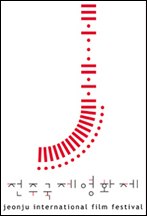Iain Harvey traveled to Korea for the Jeonju International Film Festival and not only uncovered a great festival, but an enthusiastic crowd and a country on the rise.

© JIFF 2002.
South Korea's recent successful progress in the football/soccer World Cup is perhaps reflective of their increasing presence in many fields. They have overcome economic setbacks, and just like their footballers, show a determination and spirit that you can only admire.
Koreans love films -- and, especially, animation. Knowing their enthusiasm, I was delighted to be invited to the Jeonju International Film Festival (www.jiff.or.kr), which ran from April 26 - May 2, 2002. Two of my films were being screened in a program entitled "War and Animation" -- Jimmy Murakami's When The Wind Blows, which I executive produced, and War Game, directed by Dave Unwin.
Jeonju is a prosperous city in the mid-south of South Korea and in fact is an ideal location -- being relatively compact, and in a very attractive setting, surrounded as it is by wooded hills. It also has the most fantastic new media center, complete with concert hall, theatres, lecture rooms and natural outdoor amphitheater. The only disadvantage is its distance from the center: a 20 minute taxi ride though as it only costs the equivalent of a few dollars, and you could take the festival bus, the main concern (for some) is that of wasted energy.
The festival is only in its third edition, with the animation being offered on a biannual basis. The animation program was extensive: as well as "War," the festival included a Raoul Servais retrospective, a focus on Czech animation, Japanese shorts and independent Korean animation. Over 100 films in all, dating back to 1927 and including some wonderful Len Lye films.

Throngs of attendees flood the streets of Jeonju, host city of the self-titled film festival. © JIFF 2002.
But this is not the main reason I wanted to write about the festival. If you need your love of, and belief in, animation to be refreshed or revived then attending a festival such as Jeonju is just the prescription. The programmers speak with both a knowledge of and interest in animation, and prioritized that festival essential -- a good party (in fact, for animation, two!). The general interest in animation, the crowd's passion and knowledge all help to ensure you leave with a renewed confidence of the relevance of animation to people all round the globe and its universal nature.
Here are two examples: a six hour all night program on "Animation and War" filled a 1500 seat theatre and four screenings of Miyazaki's new masterpiece Spirited Away (another film to inspire filmmakers to new heights) all sold out before the festival even started.
Korea is well known as a production source for much of the animation that appears on our television screens. As other countries undercut them in cost, their emphasis on quality has increased. Now a genuine creative circle of animators is growing. Somehow they are finding the resources to make their own shorts, not easy in a country without any financial base for such productions. Finally, the fact that a Korean film (My Beautiful Girl, Mari directed by Sung-gang Lee) has just won the feature film award at Annecy is no coincidence.
Watch this space!
Following a career in publishing, Iain Harvey entered the world of animation as executive producer of The Snowman (1982). Subsequently, he went on to executive produce projects such as When the Wind Blows (1987), Father Christmas (1991) and the BBC television series Spider (1991). In 1993 he formed The Illuminated Film Company going on to produce award-winning projects as The Very Hunger Caterpillar & Other Stories, T.R.A.N.S.I.T., Christmas Carol: The Movie and War Game. For information on The Illuminated Film Company and its productions, see: http://www.illuminatedfilms.com







